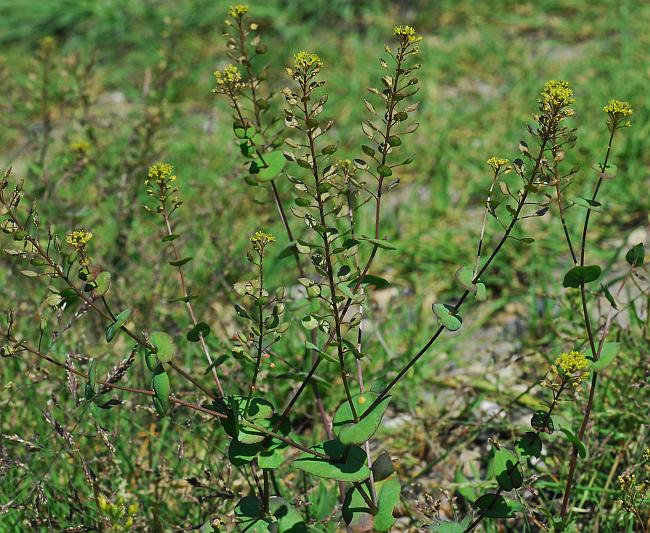Lepidium perfoliatum L.

Introduced
CC = *
CW = 3
MOC = 6
© SRTurner
Lepidium perfoliatum L. | |
 |
Introduced CC = * CW = 3 MOC = 6 |
© SRTurner |
|
Family - Brassicaceae Habit - Annual or biennial forb. Stem - Erect, 10-40 cm long, usually unbranched below the inflorescence, usually sparsely pubescent with short, spreading hairs toward the base, glabrous and glaucous toward the tip.
Leaves - Basal and alternate. Basal and lowest stem leaves 4-13 cm long, 2 or 3 times pinnately divided with linear divisions, minutely hairy. Median and upper stem leaves 0.7-3.0 cm long, ovate to circular, the bases perfoliate or strongly clasping the stems with rounded, strongly overlapping auricles, the margins entire to minutely toothed, glabrous and glaucous.
Inflorescence - Terminal panicles or racemes, ebracteate.
Flowers - Sepals 0.8-1.0 mm long, broadly elliptic. Petals 1.0-1.5 mm long, yellow. Stamens 6. Styles 0.1-0.3 mm long.
Fruits - Silicles 3.0-4.0 mm long, ovate to nearly circular in outline, flattened, the tip with a minute notch and short, narrow wings. Seeds 1.6-2.0 mm long, elliptic in outline, narrowly winged all around, the surface with a fine, netlike or honeycomb-like pattern of ridges and pits, reddish or dark brown.
Flowering - April - June. Habitat - Railroads, roadsides, open disturbed areas. Origin - Native to Eurasia. Lookalikes - None. Other info. - This species is rare in Missouri, usually found along railroads where the seeds are presumably deposited by passing trains. It is found in only a few widely scattered counties in the state, with no discernable geographic pattern. It is far more common in the western half of the continental U.S. The plant is easily recognized, with uniquely shaped leaves and yellow flowers. All other species of Lepidium in Missouri have white flowers. Photographs taken near Three Forks, Gallatin County, MT, 6-11-2015 (SRTurner). |